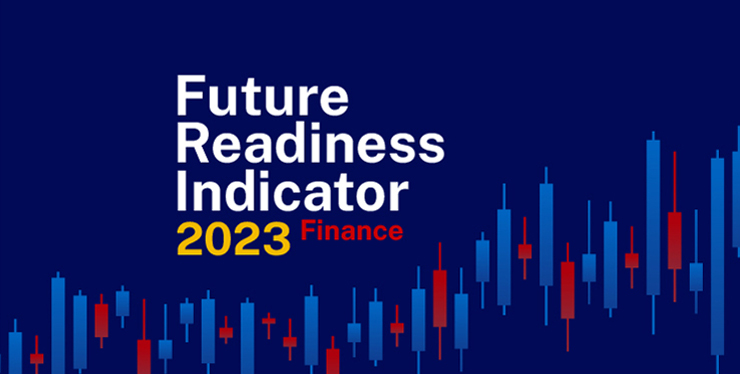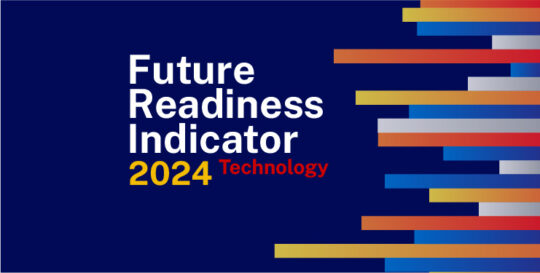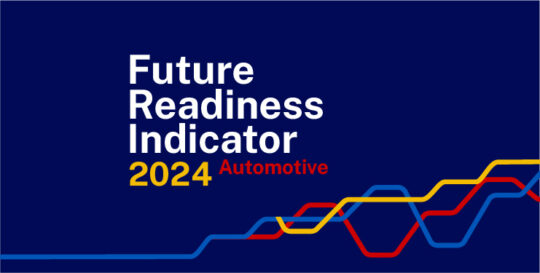IMD business school for management and leadership courses



Future Readiness Indicator
The future of finance: Who is winning the readiness race?
Financial institutions that embrace digitalization, embed environmental, social, and governance (ESG) principles, and deliver seamless customer experiences maintain their lead in a rapidly evolving financial services landscape.
- The ability to innovate and adapt will be the key differentiator in the financial services landscape
- Payment giants continued to demonstrate their dominance: Mastercard and Visa have adaptable business models, focus on digital payments, and invest in AI-powered services and products to ensure future readiness
- Technological prowess is key: Significant investment in digital transformation and cloud-native infrastructure gives the likes of DBS Bank and JPMorgan Chase the agility needed to forge ahead
- Companies like Coinbase, Block, and PayPal embrace emerging technologies to drive efficiency, enhance customer experiences, and open up new business models
Finance trends to watch: What is driving the industry?
The financial services landscape is rapidly evolving, fueled by technological innovation, changing customer expectations, and a heightened focus on sustainability.
- Digitalization, technology adoption, and the rise of AI: Financial institutions are rapidly accelerating their digital transformation journeys and leveraging cloud technologies, AI, blockchain, and mobile capabilities to streamline operations, personalize experiences, and drive new business models.
- Sustainable finance and ESG integration: The push towards a greener, more inclusive economy is reshaping financial services. Investors, regulators, and consumers are demanding firms embed ESG factors into their investment strategies, product development, and operations.
- The changing face of customer expectations: Customers now expect seamless, omnichannel experiences, highly personalized services, and real-time interactions across digital platforms.
- Fintech disruption and collaboration: Fintech startups and digital-only banks are forcing incumbents to innovate – or risk being left behind. Established players are responding through partnerships, acquisitions, and an increased focus on internal innovation.
- Open finance, APIs, and embedded services: APIs are creating new possibilities for collaboration, unbundling traditional financial services, and enabling embedded finance where financial products are integrated into non-financial platforms.
- The imperatives of cybersecurity and data privacy: The growing cyberthreat landscape and tighter data privacy regulations require financial institutions to prioritize robust security frameworks and ethical data handling practices.
Finance powerhouses: Who is leading the pack?
Mastercard and Visa: These payment giants continued to demonstrate their dominance. Strong financial results reflect their adaptable business models, focus on digital payments, and investments in value-added services. Their global networks position them to capitalize on the rebounding travel sector.
Mastercard’s acquisition of Finicity, a leader in open banking, in 2020 strengthened its position in the era of open finance. It has also deployed a broad range of AI-powered services and products. Some of its technology has already been put to work for over a decade, particularly in the realm of cybersecurity. Last year, Mastercard piloted its Biometric Checkout Program, which enables shoppers to pay for their purchases simply by smiling at a camera or waving their hand over a reader for a fast and secure checkout experience.
Over the last 10 years, Visa has spent more than $3bn on AI and data infrastructure to enable the safer, smarter movement of money and to proactively identify and prevent fraud. It has forged partnerships with over 100 crypto platforms and wallets, enabling the conversion of digital currency to fiat, which highlights its adaptability.
Both companies have heavily invested in AI and data analytics, using hundreds of AI models to enhance security, personalize offerings, and combat fraud. Their commitment to innovation is evident in initiatives such as Mastercard’s Start Path, an incubator for later-stage startups, and Visa’s Creator Program, supporting digital-first artists.
DBS Bank and JPMorgan Chase: These institutions stand out for their technological prowess.
DBS Bank’s early commitment to digital transformation and cloud-native infrastructure gives it agility. The bank’s AI journey began in 2018 with a focus on developing analytics capabilities, fostering a data culture, upskilling employees, and enabling data accessibility. The bank has since developed over 600 AI and machine learning models and 300 use cases.
Central to DBS’s AI strategy are its in-house platforms: ADA (Advancing DBS with AI) and ALAN, an AI protocol and knowledge repository. ADA serves as a single source of truth, ensuring data governance, quality, discoverability, and security, with over 90% of useful data discoverable on the platform. ALAN enables rapid end-to-end deployment of AI models.
JPMorgan Chase invests over $14bn annually in technology, fueling It has significantly increased its AI deployment, with over 300 AI use cases in production, achieving a 34% year-over-year increase. JPMorgan Chase expects to realize $1.5bn in business value from AI investments by the end of the year.
The firm is advancing its multi-vendor public cloud strategy and has moved 38% of its infrastructure to the cloud – an 8% increase from the previous year. It aims to have 80% of its infrastructure on modern platforms within three years.
Both banks have developed in-house AI platforms to speed up model development and deployment, showing a commitment to staying ahead of the curve.
HSBC: HSBC’s big surge in this year’s indicator is reflected by its strong financial performance. It reported a record profit before tax of $30.3bn in 2023, a significant increase of $13.3bn compared to 2022. has been building in areas expected to drive future growth, such as wealth management, where they attracted $84bn of net new invested assets in 2023. Meanwhile, it has maintained a focus on cost discipline, targeting cost growth of approximately 5% for 2024 compared to 2023. These factors have also positioned the bank well for future growth and innovation.
Gamechangers: Rising stars continue to disrupt finance
Companies like Coinbase, Block, and PayPal are also notable for their focus on emerging technologies.
As a leading cryptocurrency exchange, Coinbase saw its revenue surge over 500% in 2021 as crypto adoption soared. Its Coinbase Commerce platform allows merchants to easily accept cryptocurrency payments from customers worldwide. It continues to invest in expanding its international presence, launching new products like derivatives trading, and engaging in public policy efforts to shape the regulatory landscape for cryptocurrencies.
Block (formerly Square) is blurring the lines between traditional finance and blockchain. Its Cash App allows seamless Bitcoin buying and selling. Block’s acquisition of Afterpay positions it strongly in the booming ‘buy now, pay later’ space.
PayPal, a pioneer in digital payments, is pursuing its ‘super app‘ strategy, integrating shopping, payments, savings, and crypto services into one app, reflecting its ambition to become an everyday financial hub. In September 2023, PayPal and Uber announced an extension of their multi-year global partnership. This deal expands their areas of collaboration, including additional payment processing, instant driver and courier payouts to PayPal and Venmo, and custom support for Uber’s new lines of business.
These success stories demonstrate that the future belongs to those who can harness the power of emerging technologies to drive efficiency, enhance customer experiences, and open up new business models.
What is clear is that as the pace of change accelerates, the ability to innovate and adapt will be the key differentiator in the financial services landscape.











